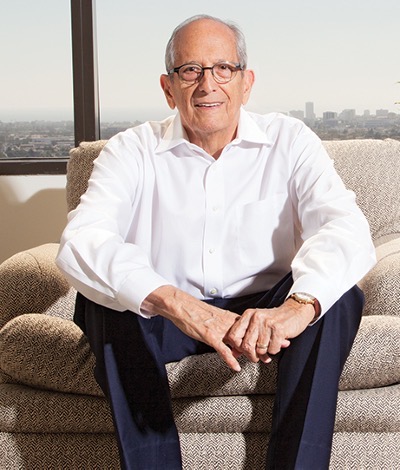
Kenneth Kleinberg is a founding partner of Century City-based Kleinberg Lange Cuddy & Carlo LLP where he serves as senior partner.
Kleinberg specializes in business negotiations and legal matters for a number of clients in the entertainment industry including writers, directors, game designers, managers and more. His high-profile clients include J.K. Rowling and LEGO, which licensed production of films with Warner Bros.
Please tell us about your career. For example, what jobs have you done in the past and how did they lead you to this job? What are your current job duties and how long have you done them?
I am a practicing entertainment attorney in Los Angeles and a partner in the boutique law firm with five other lawyers. My work involves legal and business advice to clients in the entertainment and media businesses. I started my career as a lawyer at the Federal Communications Commission in Washington, D.C. in 1967. Thereafter, I went to work at Mitchell Silberberg & Knupp, a well-established prestigious law firm in Los Angeles where I was initially assigned at the firm’s offices at Columbia Pictures, one of its clients.
I became a partner of that firm in 1974 and worked there until 1985. Following that point, I departed the practice of law to serve as President and Chief Operating Officer of an independent motion picture and television production company.
I re-established my law practice in 1992 with the founding of Kleinberg Lange Cuddy & Carlo LLP. My current work involves advice and counsel to a wide variety of individuals and companies in the entertainment and media space, including actors, authors, writers, directors, producers, composers and song writers.
How many hours do you work each week?
I have no minimum or maximum of hours that I work each week. My workload depends upon the volume of work generated by my clients.
You are still working well past the age many people retire. Why?
My work is very interesting and compelling. Among other things, my clients are some of the most creative people in the world of the performing and visual arts.
What’s the best part of working in your 80s?
My work is very stimulating and presents multiple opportunities to engage in problem solving for my clients, which is endlessly fascinating and challenging.
And the worst?
Disappointments that come from an inability to achieve the client’s objectives by reason of events or problems beyond my control.
Have you slowed down on the job or are you still putting in the same number of hours as always?
I have somewhat slowed down as a result of age and having had a difficult encounter with Covid two years ago.
Do you think you’ll ever retire? If so, at what age?
Yes. I will retire when I conclude that I am no longer effective to the extent necessary to do the best job possible for the client. I have not established a “retirement age.”
If you were to retire, what do you suppose you’d do with your time?
I would spend more time with my family, more time travelling and more time with my philanthropic efforts relating to the advancement of the activities of UKRO (University Kidney Research Organization), a 501(c)(3) medical research public charity that I co-founded.
What advice would you give to someone who was weighing whether to continue working past retirement age?
The answer to this question is entirely dependent on the status of the individual in question and the nature of their practice. It is not something in which one can give advice in general.
If you had it to do all over again, knowing what you know now, what would you do differently in your career?
I might have preferred to pursue a career in politics, a field which is sorely lacking good people. I worry about the terrible lack of honest, responsible leaders in the realm of politics and feel that average citizens need to do something about it—more than just talking about it. The future depends upon quality people seeking and discharging responsibility in the governing of a working democracy.
What’s one of the biggest lessons you learned from your time on the job?
It is essential to give advice that is informed and objective, and is not improperly influenced by extraneous issues which may ultimately be harmful to the client. At the top of the list are recognizing and avoiding potential conflicts of interest and adherence to the rules of professional conduct applicable to attorneys.
